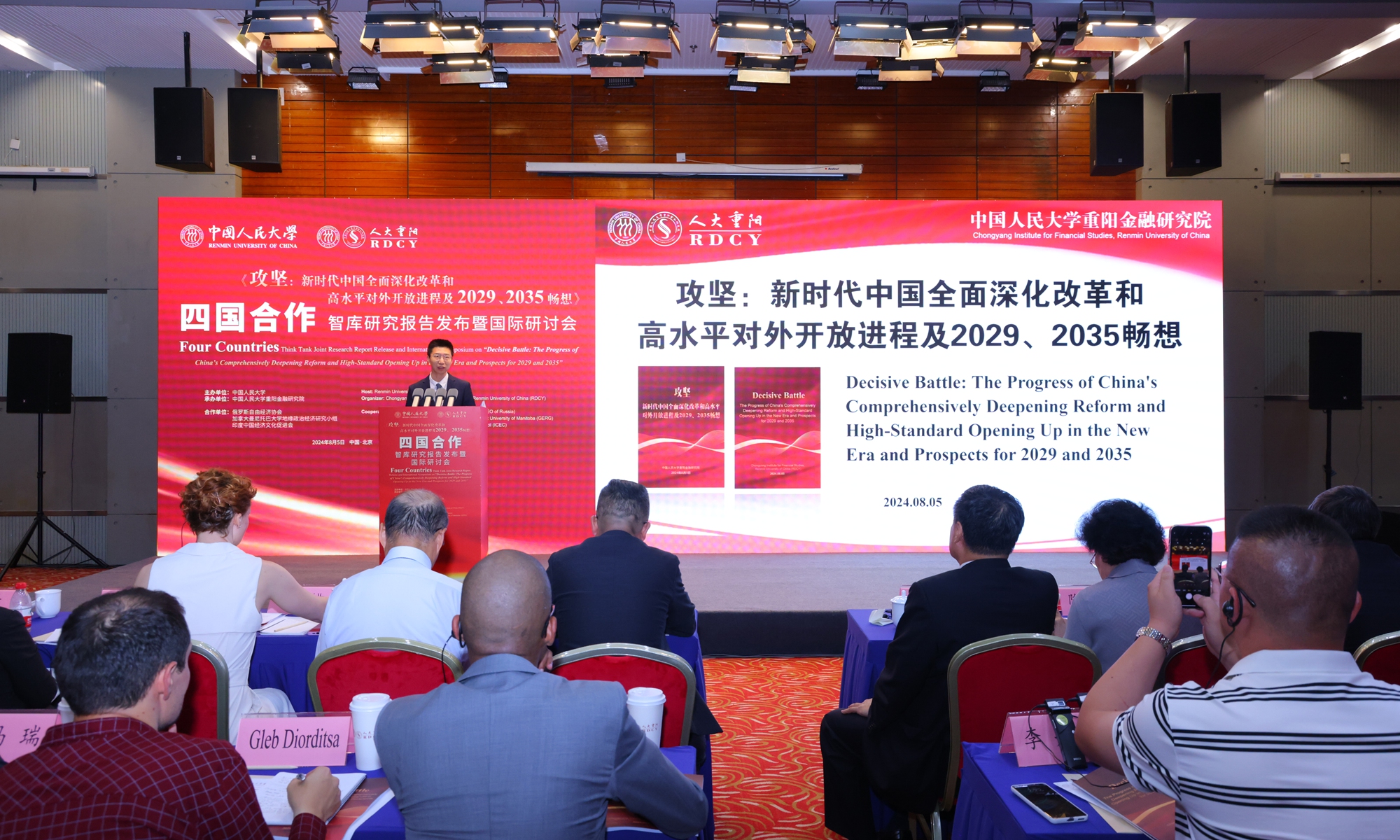
Four countries think tank joint research report release and international symposium, held in Beijing on August 5, 2024 Photo: RDCY
Editor's Note:
The recently concluded Third Plenary Session of the 20th Central Committee of the Communist Party of China (CPC) continues to spark discussion among international experts. On Monday, at an international symposium held in Beijing, experts and scholars from more than 10 countries discussed the achievements of China's reform and opening-up efforts in the new era. They also looked forward to the further comprehensive deepening of reform and the high-level opening-up process in China.?
The symposium released a research report titled "Decisive Battle: The Progress of China's Comprehensively Deepening Reform and High-Standard Opening Up in the New Era and Prospects for 2029 and 2035," jointly written by scholars from the Chongyang Institute for Financial Studies at Renmin University of China and think tank scholars from Russia, Canada and India. The Global Times has highlighted the viewpoints of three experts who attended the symposium.
Zhu Guangyao, former Chinese vice finance minister
The relationship between the Chinese economy and the world economy, especially the impact of China-US economic relations on the future direction of the world, is highly valued by the international community. The US is trying to bring industries, especially the chip industry and electric vehicles, back to the US with a "small yard and high fence" strategy and by providing special subsidies.?
The Third Plenum has given a firm answer to the world. We will further deepen reform and opening-up with unwavering determination. We will continue to make great efforts to advance China in reform and opening-up, while also making China's economy more closely integrated with the world economy. Deepening reform and opening-up in China and closely integrating with the world are in the interests of China and the world.
Next year is a key year for formulating the 15th Five-Year Plan (2026-2030) and the last year of the 14th Five-Year Plan (2021-2025). Next year, we are fully confident that we will maintain our economic growth at 4.5 to 5 percent. We are fully confident in achieving Vision 2035.
Sergey Glaziev, former counselor to the president of the Russian Federation
All around the world, during the last few days, people have watched the resolution of the CPC Central Committee on further deepening reform comprehensively to advance Chinese modernization. I have a clear understanding that the Chinese leadership has a clear vision and strategic plans that will be implemented because they are based on a scientific approach and are comprehensive. This gives a new impulse for development in both the economic, social and technical spheres.
For the development of a global community of shared future, we need the strategic initiative to accelerate global changes and create a new trend of growth in the world economy. China provides us with a very good example. I'm sure that by building a modern socialist market economy, China will increase the efficiency of all the resources used in the country. As an economist, I should say that this is the right approach.?
We expect to receive multipolar economic organization. And China, for sure, will play the role of the core in this new economic mode.?
Radhika Desai, professor at the department of political studies of the University of Manitoba
China's economic success has been the subject of both admiration and envy. However, most, do not appreciate just how great the magnitude of China's achievement is. Usual comparisons of China with Western countries or the US forget a key fact: China's economic and social advances have been achieved from a starting point that was farther back from that of the West, given the setbacks imposed by imperialism.
The outcome of the Third Plenum has been criticized in the West for the simple reason that it dares to propose what the West wishes China will never do and what the West simply still cannot believe China is capable of doing. China is mastering the productive forces in a way that puts it ahead of the decaying financialized capitalist economies of the homelands of capitalism and imperialism.?Such imperialist resistance to China's development continues today and is even admitted by high-level US state officials, who openly state that the US aims to "hobble" China. Needless to say, the West does not want China to continue investing in its technological prowess and pose a technological competitive threat to the West's traditional dominance of high technology lines of production.
